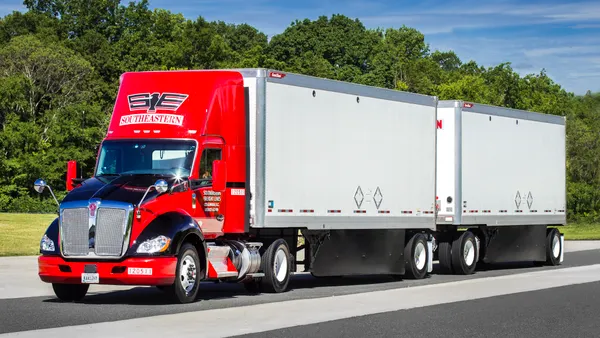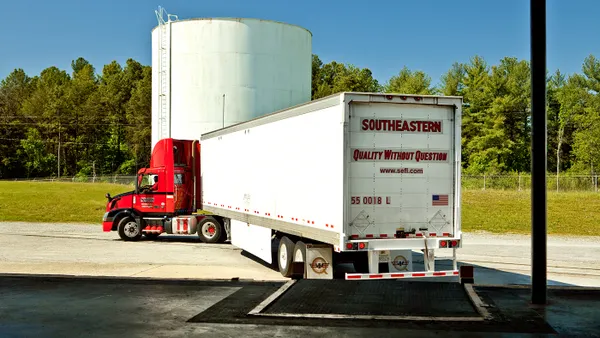As an asset-based carrier grows and stretches its current team’s capacity, choosing the optimal trucking dispatch software system can be a game-changer. The right solution can streamline operations, enhance efficiency, boost profitability and fuel business growth without requiring a proportionate increase in headcount. Moreover, the best trucking dispatch software can make your team's job easier and more enjoyable, leading to increased employee satisfaction and retention.
As carriers evolve, so do their software needs and there is no one-size-fits-all solution. Some carriers run dedicated regional lanes. Others do frequent local trips. Others have a warehousing operation or focus on LTL or partial loads. You may have a brokerage or be a division of a larger company.
Regardless of your fleet size or business model, selecting the right dispatch solution is crucial for success. Here, we delve into the top seven trucking dispatch software providers, assessing their strengths, target audiences and distinctive offerings.
Top recommendation
Truckbase, the modern carrier's gold standard
Truckbase stands out as a premier choice for growing asset-based carriers, particularly those with roughly 10-100 trucks, offering a comprehensive, modern and easy-to-use TMS that provides immediate ROI due to its quick implementation. Its strengths lie in a simple yet powerful dispatch system that eliminates the need for data entry, thereby streamlining the logistics management process. The platform integrates seamlessly with over 30 Electronic Logging Devices (ELDs) and QuickBooks, ensuring easy data synchronization and eliminating double data entry, which significantly reduces manual labor and errors.
If billing and invoicing is a pain point, Truckbase offers instant invoicing, expediting payments and a customer-facing portal should certain customers want direct 24/7 visibility into their loads. The software also includes robust driver settlement capabilities, ensuring clear and trustworthy compensation for drivers.
A key aspect of Truckbase’s dispatch software is its ability to automate mundane tasks, allowing teams to focus on more strategic activities like booking and delivering higher-paying loads. The platform's truck tracking software, integrated with multiple ELD providers, offers real-time load visibility, tailored notifications and the elimination of unnecessary check calls, thereby enhancing overall fleet performance.
Truckbase's AI-powered load importer automates load creation, and its mobile-friendly app enables drivers to easily scan and upload Bills of Lading (BOLs), receive clear schedules and stay updated, which streamlines communication and operational processes. Moreover, Truckbase is designed to be turnkey for smaller fleets and scalable for larger ones, offering a centralized data hub that's easily accessible, user-friendly and supports growth without the need for supplementary administrative work.
In conclusion, Truckbase presents a balanced and comprehensive trucking dispatch software solution that caters to the evolving needs of asset-based carriers, especially those in the 10-100 truck range. Its focus on automation, efficient data management and driver satisfaction makes it a standout choice for fleet owners seeking to grow their business while maintaining operational efficiency and employee satisfaction.
Other trucking dispatch software solutions to consider
2. Mcleod Software: the enterprise solution for the largest carriers
McLeod Software caters to the needs of large carriers with fleets ranging from hundreds to thousands of trucks. Its comprehensive suite of features includes dispatch, routing, optimization and compliance tools, making it a powerful solution for complex logistics operations. However, its enterprise-level capabilities come with a hefty price tag and a steeper learning curve compared to newer, more user-friendly options.
3. TMW Suite: The veteran for established carriers
TMW Suite by Trimble is a well-established player in the trucking industry, known for its extensive feature set tailored to mega carriers. It tends to compete head-to-head with McLeod. With its vast capabilities, TMW can effectively manage fleets with many hundreds to thousands of trucks. However, its older codebase can sometimes translate to a less intuitive user experience compared to newer entrants. Additionally, its comprehensive capabilities require a significant financial and time investment, often involving adding new team members to manage the system.
4. AscendTMS: The free TMS for micro carriers
AscendTMS offers a cost-effective solution for micro carriers operating on tight budgets. While it provides basic trucking dispatch capabilities, its user interface and overall functionality may not meet the needs of growing fleets. However, its zero-cost offering makes it an attractive option for startups or smaller fleets with limited resources.
5. Axon Software: Comprehensive TMS with built-in accounting
Axon Software stands out for its unique offering of integrated accounting software. However, this built-in accounting system is less user-friendly and less widely adopted than mainstream options like QuickBooks. This can make it a challenging transition for accounting teams, and the lack of familiarity with Axon's software suite often requires more onboarding and training for finance and accounting staff. While Axon provides a comprehensive set of features such as dispatch and driver settlements, it still requires a significant amount of manual data entry compared to the automation capabilities of platforms like Truckbase.
6. ITS Dispatch: Tailored for small fleets and brokerage operations
ITS Dispatch positions itself as a specialized solution for owner-operators and small fleets, especially those managing 1-10 trucks and engaging in brokerage activities. This trucking dispatch software platform stands out with its integrated brokerage module and its connectivity with Truckstop’s load board, offering a significant advantage for those balancing fleet management and brokerage services. While ITS Dispatch excels in serving this niche market, growing fleets might find it lacking in certain advanced features. These include mobile scanning, live tracking and a dedicated driver app, which are essential for larger operations looking to scale efficiently. Usability and design are clunky and long outdated.
7. Google Sheets: the DIY approach for startups
For startups, owner-operators, or those on a tight budget, Google Sheets offers a basic yet trucking dispatch solution. As a web-based spreadsheet tool, it allows for real-time collaboration and can be accessed from anywhere. While it lacks support for complex macros like Excel, it is easier to use when multiple team members are working from a single sheet. Tech-savvy users can harness its capabilities to create custom dispatch workflows, and comment functionality allows for easy communication between team members. However, the lack of dedicated TMS features means it requires significant manual input and lacks the automation and integrations available in more specialized TMS solutions.
Conclusion
The choice of a trucking dispatch software provider largely depends on the specific needs, size and growth trajectory of your fleet. For those in the 10-100 truck range, especially those seeking to leverage technology for efficiency and growth, Truckbase stands out with its intuitive design, robust features and excellent customer support. Larger fleets might lean towards more comprehensive but complex solutions like McLeod Software or TMW Suite. Meanwhile, smaller operations or startups may find cost-effective alternatives like AscendTMS or Google Sheets sufficient for their initial stages.
Carrier TMS software FAQs
What makes Truckbase a preferred choice for mid-sized fleets?
Truckbase caters specifically to the 10-100 truck fleet segment, offering an ideal balance of advanced features and user-friendly design, making it a top choice for growing, technology-driven carriers.
How does trucking dispatch software improve fleet efficiency?
TMS software streamlines operations, automates routine tasks and provides real-time insights, helping fleets optimize routes, reduce administrative workload and enhance overall efficiency. Truckbase customers have cited a 30% reduction in workload.
Can small fleets benefit from using trucking dispatch software?
Yes, small fleets can benefit from trucking dispatch solutions like AscendTMS or Google Sheets, which offer basic functionalities at a lower cost, helping to manage operations more effectively than manual methods.
Are there TMS options for large fleets with complex operations?
Large fleets with complex logistics operations can consider solutions like McLeod Software or TMW Suite, which offer comprehensive features and customization options. Truckbase increasingly serves larger fleets, and may be a good option to consider as well.
What should a fleet owner consider when choosing trucking dispatch software?
Fleet owners should assess factors such as fleet size, growth objectives, budget, required features and ease of use when selecting trucking dispatch software. Be sure to evaluate the ease-of-use and expected efficiency gains with each tool you consider.
How does Truckbase support growth for mid-sized carriers?
Truckbase supports growth by offering scalable solutions, efficient dispatch and invoicing capabilities and seamless integrations, enabling mid-sized carriers to expand operations without a proportionate increase in overhead.
Is it feasible for a fleet to switch to a different trucking dispatch software solution?
Yes, transitioning to a different trucking dispatch software provider is feasible, especially when the new system offers better alignment with the fleet's evolving needs and growth objectives. However, it requires careful planning and training to ensure a smooth transition.










